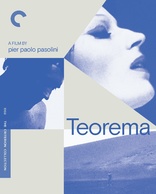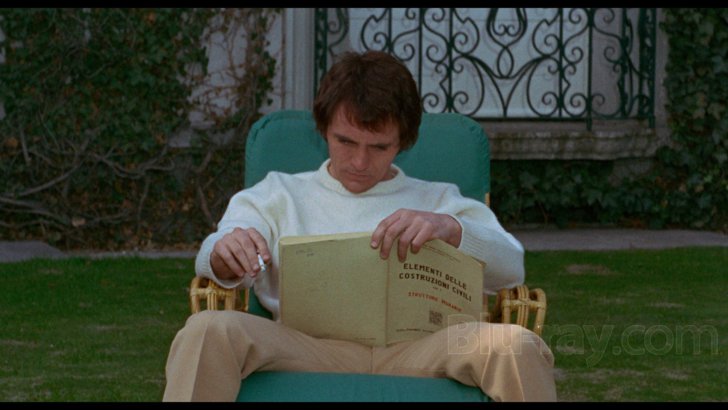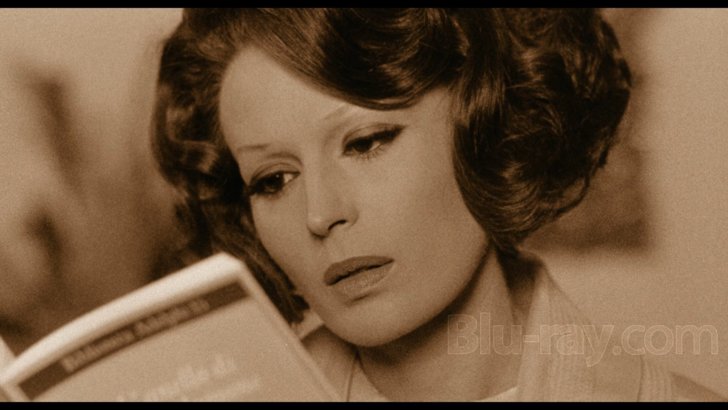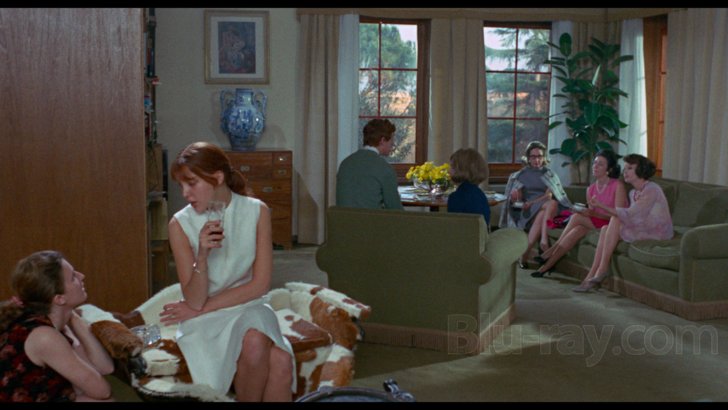Teorema Blu-ray Movie
HomeTeorema Blu-ray Movie 
Criterion | 1968 | 99 min | Not rated | Feb 18, 2020
Movie rating
7 | / 10 |
Blu-ray rating
| Users | 0.0 | |
| Reviewer | 5.0 | |
| Overall | 5.0 |
Overview
Teorema (1968)
A mysterious stranger seduces the members of a wealthy Milanese family, precipitating an existential crisis in each of their lives.
Starring: Silvana Mangano, Terence Stamp, Massimo Girotti, Anne Wiazemsky, Laura BettiDirector: Pier Paolo Pasolini
| Foreign | Uncertain |
| Drama | Uncertain |
| Surreal | Uncertain |
| Mystery | Uncertain |
Specifications
Video
Video codec: MPEG-4 AVC
Video resolution: 1080p
Aspect ratio: 1.85:1
Original aspect ratio: 1.85:1
Audio
Italian: LPCM Mono
English: Dolby Digital Mono
Subtitles
English
Discs
Blu-ray Disc
Single disc (1 BD)
Playback
Region A (locked)
Review
Rating summary
| Movie | 5.0 | |
| Video | 5.0 | |
| Audio | 5.0 | |
| Extras | 3.5 | |
| Overall | 5.0 |
Teorema Blu-ray Movie Review
Reviewed by Dr. Svet Atanasov January 18, 2020Pier Paolo Pasolini's "Teorema" (1968) arrives on Blu-ray courtesy of Criterion. The supplemental features on the disc include an archival interview with actor Terence Stamp; vintage audio commentary by Italian film expert Robert Gordon; new program with film scholar John David Rhodes; and more. The release also arrives with an illustrated leaflet featuring an essay by critic James Quandt and technical credits. In Italian or English, with optional English subtitles for the main feature. Region-A "locked".

The stranger
The film opens up with a short prologue in which an agitated reporter interviews a group of workers in front of a giant factory. Some of the men look surprised, some look confused. They are the new owners of the factory but are unsure what their responsibilities are. When they followed orders it was easier for them to react, to be united, to know their enemy. But now it seems like their enemy has evolved and is making the revolutionary changes they should have demanded.
The action moves to a luxurious villa in the wealthiest area of Milan. This is where the former owner (Massimo Girotti, Ossessione, La finestra di fronte) of the factory and his family live. Shortly after all members of the family gather in the villa for a rather boring party, a handsome stranger appears (Terence Stamp, The Hit, Spirits of the Dead). At first no one seems to notice him, but he quietly observes them. Later on the mother, Lucia, (Silvana Mangano, Conversation Piece, Riso Amaro), her daughter, Odetta (Anne Wiazemsky, La Chinoise, Rendez-vous), and the maid, Emilia (Laura Betti, A Bay of Blood, Novecento) begin observing the stranger while he casually wanders around the villa. After the party, Pietro (Andrés José Cruz Soublette), the son, is asked to share the same room with to the stranger and he talks to him while getting ready to go to bed. Soon after, the father also notices the stranger.
The rest of the film is about a series of dramatic character transformations, each initiated by the stranger. But why? And who is the stranger?
The first question is easy to answer. The stranger inspires the family members to drop the bourgeois masks they have been wearing – the bored Lucia decides to stop being a mother and goes on the road looking for men that will make her feel alive again; Odetta reveals that she is finally ready to fall in love but instead has a life-altering divine experience; Pietro turns his back on Renaissance art and embraces abstract art; Emilia finds the courage to leave her employers and becomes a saint; and the father stops carrying about his image and goes on a spiritual journey after visiting Milano Centrale.
The second question isn’t easy to answer. For years film critics have been speculating that the stranger could be God. But is he? And does it really matter? In Theorem he is essentially Pasolini’s litmus test, a force that can corrupt or free people regardless of their social status, regardless of their past history. And once he does, Pasolini goes on to show how and why all of their beliefs, ideas and values should be questioned. Whether the force is God, or the Devil, or something else is irrelevant. The message of the film is that politics, art, and religion are used to manipulate and control those who are naive enough not to question their function.
Because there is very little dialog in the film, the communication is done primarily through series of carefully composed images. Some are quite unusual. For example, the cold and bleak panoramic shots from the factory very much remind of Michelangelo Antonioni’s Red Desert, while some of the footage from the finale could have easily been used in Alejandro Jodorowsky's El Topo. The film was lensed by the great cinematographer Giuseppe Ruzzolini, who also collaborated with Pasolini on Oedipus Rex and Arabian Nights.
Some of the most atmospheric sequences in Theorem are enhanced with music by W. A. Mozart (Requiem, Lacrimosa) and the legendary Ennio Morricone.
Note: Theorem is the second film in Pasolini’s “Mythical Cycle”. The remaining films are Oedipus Rex, Porcile and Medea.
Teorema Blu-ray Movie, Video Quality 

Presented in its original aspect ratio of 1.85:1, encoded with MPEG-4 AVC and granted a 1080p transfer, Teorema arrives on Blu-ray courtesy of Criterion.
The following text appears inside the leaflet that is provided with this Blu-ray release:
"This new digital transfer was created in 4K resolution on an ARRISCAN film scanner from the 35mm original camera negative at Cinecitta in Rome. Thousands of instances of dirt, debris, scratches, splices, and warps were manually removed using MTI Film's DRS, while Digital Vision's Phoenix was used jitter, flicker, and small dirt. The original monaural soundtrack was remastered from a low-contrast 35mm print using Avid's Pro Tools and iZotope RX.
Colorist: Lee Kline/Criterion Post, New York."
The release is sourced from a very nice new 4K master. Practically everywhere there are new ranges of fine details and nuances that improve depth and clarity, so on a larger screen the visuals really become vastly superior. (You should easily be able to tell that on the previous master that the BFI used for this Region-B release the black crush obstructs plenty of native detail). Fluidity is also improved. The new master is better graded and balanced. In some sequences the difference is rather striking because the primaries and the nuances are expended and rebalanced (see screencapture #3). There are no traces of problematic digital adjustments and rather predictably grain is better exposed and distributed. Finally, the entire film looks very clean and healthy. (Note: This is a Region-A "locked" Blu-ray release. Therefore, you must have a native Region-A or Region-Free player in order to access its content).
Teorema Blu-ray Movie, Audio Quality 

There are two standard audio tracks on this Blu-ray release: Italian LPCM 1.0 and English Dolby Digital 1.0. Optional English subtitles are provided for the main feature.
I pulled out my BFI release and did some direct comparisons between the Italian tracks. I can confirm that the Italian audio is not recycled, and that on the new lossless track clarity is actually slightly but all around better. If you have both discs, compare the choir performance around the 01.23 09 mark. There are no audio dropouts, distortions, or pops to report.
Teorema Blu-ray Movie, Special Features and Extras 

- Pasolini Introduction - this archival introduction was recorded by Pier Paolo Pasolini and first broadcast on February 8, 1969. The director responds to questions from journalist Cecile Philippe. In French, with optional English subtitles. (3 min, 1080i).
- Terence Stamp - in this archival video interview, actor Terence Stamp recalls how he became involved with Teorema and talks about his early work with Federico Fellini. (Stamp played an English actor in Fellini's segment in Spirits of the Dead), his first encounter with Silvana Mangano, the Sixties philosophies and their influence on Pier Paolo Pasolini's films, etc. The interview was conducted by Rossana Capitano in London, in 2007. In English, not subtitled. (34 min, 1080i).
- John David Rhodes - in this new video interview, film scholar John David Rhodes, author of Stupendous, Miserable City: Pasolini's Rome. deconstructs Teorema. The interview was conducted exclusively for Criterion in 2019. In English, not subtitled. (17 min, 1080p).
- Commentary - this audio commentary was recorded by Italian film expert Robert Gordon, author of Pasolini: Forms of Subjectivity, in 2007. It initially appeared on the British Film Institute's R2 DVD release of Teorema.
- Leaflet - an illustrated leaflet featuring an essay by critic James Quandt and technical credits.
Teorema Blu-ray Movie, Overall Score and Recommendation 

I like Teorema so much that I would enthusiastically rank it above most of the big critically acclaimed films in Piere Paolo Paolini's body of work. It is poetic and disturbing at the same time, a fascinating enigma that can play with the mind in some pretty unusual ways. I wasn't sure that it would enter the Collection, but now that it has I could not be happier. This upcoming release is sourced from a very solid new 4K master that makes revisiting the film quite a treat. The year has just started, but I am quite certain that it will be on my Top Ten list at the end of it. VERY HIGHLY RECOMMENDED.
Similar titles
Similar titles you might also like

Medea
1969

Porcile
1969

The Hawks and the Sparrows
Uccellacci e uccellini
1966

Oedipus Rex
1967

Accattone
1961

Mamma Roma
1962

The Gospel According to St. Matthew
Il vangelo secondo Matteo
1964

Belle de jour
1967

Red Desert
Il deserto rosso
1964

Loveless
Нелюбовь / Nelyubov
2017

Goodbye to Language 3D
Adieu au langage
2014

The Image Book
Le livre d'image
2018

Zama
2017

L' humanité
Humanité
1999

La Chinoise
1967

Horse Money
Cavalo Dinheiro
2014

The Conformist
Il Conformista | 4K Restoration
1970

L' Avventura
1960

Pasolini
2014

Cemetery of Splendor
2015
